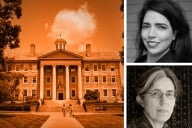You have /5 articles left.
Sign up for a free account or log in.

Lawrence S. Bacow
Harvard University
Lawrence S. Bacow, who led Harvard University through the pandemic and spent more than 50 years studying, teaching at and presiding over three major universities in the Boston area, announced Wednesday that he would step down as Harvard’s president next summer.
“There is never a good time to leave a job like this one, but now seems right to me,” Bacow said in a prepared statement. “Through our collective efforts, we have found our way through the pandemic. We have worked together to sustain Harvard through change and through storm, and collectively we have made Harvard better and stronger in countless ways.”
When Bacow stepped down as president of Tufts University, in 2016, he described a decade as the optimal length of a presidency. “I have often said that 10 years is about the right term for a university president. It is long enough for one individual to have a substantial impact but not so long that the institution, or the president, becomes comfortable.”
Bacow will leave Harvard after a presidential stint about half as long, making his tenure one of the shortest in the university's recent history. But that period included two full years of the COVID-19 pandemic, each of which arguably counts as three. (He also spent seven previous years as a member of the Harvard Corporation, the university’s main governing body.)
Letter to the Editor
A reader has submitted
a response to this article.
You can view the letter here.
Find all our Letters
to the Editor here.
During that period, the university sued to block a federal policy that would have prevented international students from living in the U.S. if their coursework would be primarily online, as it inevitably would be. “Larry immediately recognized the harm this would cause not only to individual students but to the entire concept of global education,” Bacow’s counterpart at the Massachusetts Institute of Technology, Rafael Reif, said in a statement. “The fact that the policy was reversed the following week is a testament to the strength of his argument.”
Bacow also has led Harvard’s effort to defend its affirmative action policy against constitutional challenge. A federal appeals court in 2020 found no evidence of discrimination against Asian American applicants in upholding Harvard’s policy, but many expect the U.S. Supreme Court to find fault with the university’s policies when it hears an appeal in the fall.
Among other highlights of Bacow’s tenure at Harvard, as covered by Inside Higher Ed:
- The university announced that it would phase out its investment in fossil fuels. “Climate change is the most consequential threat facing humanity. The last several months have laid at our feet undeniable evidence of the world to come—massive fires that consume entire towns, unprecedented flooding that inundates major urban areas, record heat waves and drought that devastate food supplies and increase water scarcity,” Bacow wrote. “We must act now as citizens, as scholars, and as an institution to address this crisis on as many fronts as we have at our disposal.”
- Harvard pledged $100 million this spring to make amends for its historical ties to slavery. “The truth is that slavery played a significant part in our institutional history,” Bacow wrote. “Enslaved people worked on our campus supporting our students, faculty, and staff, including several Harvard presidents. The labor of enslaved people both far and near enriched numerous donors and, ultimately, the institution.”
- The university significantly expanded its research into pressing problems in society, including a new center for the study of natural and artificial intelligence and a new center for cities.
Before being appointed Harvard’s president, Bacow spent 10 years as president of Tufts University, in Medford, Mass., and 24 years as a faculty member and administrator at MIT.
The son of immigrants, he attended college at MIT and then earned three degrees from Harvard, including a Ph.D. in public policy. His scholarly work has included environmental policy, bargaining and negotiation, economics, law, public policy, and higher education.









